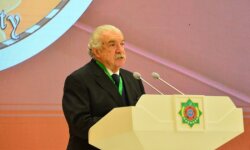The head of the Public Fund commended the management system under Tokayev.
 In the second decade of October, some so-called «liberal and independent» media reported that Kazakhstani human rights activists intend to hold a rally in Almaty. «Oppositionists» want to force the authorities to stop persecution for political reasons and implement radical reforms in politics. The development of the internal political situation in Kazakhstan, as well as the existence of social lifts, was commented by Gulmira Ileuova, the head of the Public Foundation «Center for Social and Political Research «Strategy» in an interview to CentralAsia.news.
In the second decade of October, some so-called «liberal and independent» media reported that Kazakhstani human rights activists intend to hold a rally in Almaty. «Oppositionists» want to force the authorities to stop persecution for political reasons and implement radical reforms in politics. The development of the internal political situation in Kazakhstan, as well as the existence of social lifts, was commented by Gulmira Ileuova, the head of the Public Foundation «Center for Social and Political Research «Strategy» in an interview to CentralAsia.news.
Nothing has changed
The requirements of the rally organizers are not unique. There were repeated accusations of violation of democratic rights, including political persecution and pressure on the media during the presidency of Nursultan Nazarbayev.
With the arrival of Kassym-Zhomart Tokayev, the internal policy has not changed, said the interviewee. The main course of public administration is the political direction set by Nazarbayev.
— It is demonstrated by the fact that no attempt was made to change the existing status quo during the second presidency. All political institutions work in the same format, — said the head of the foundation.
Moreover, one of the key bodies of the republic, the Security Council of Kazakhstan, is under Nazarbayev’s control. The new president also did not engage in the revision of the program and ideological documents. Tokayev also did not make any decisions that would contradict the previously announced goals. Gulmira Ileuova noted that people who are much more loyal to the 1st president than to the current one are still appointed to high positions in Kazakhstan.
The expert commented on the differences between Nazarbayev and Tokayev within the process of government.
— Using Max Weber’s terminology, we are dealing with two different types of domination or legitimacy. Nazarbayev is charismatic, authoritarian-minded and, one might say, an emotional leader. He built the state administration apparatus for himself. Therefore, the next leader can sometimes have difficulties with understanding some of the formed bureaucratic formations, state bodies, as well as the specifics of the relationships between them, — the expert believes.
Gulmira Ileuova considers Tokayev a politician more inclined towards «legal domination» She marked that now a priority in the management method is given to the state-bureaucratic model. The current leader may try to reduce the level of influence of non-institutional, primarily clan, influences on politics in Kazakhstan.
To the top not only with Nur Otan
In Kazakhstan, the opposition believes that the pro-government Nur Otan party is the only way to make a career, especially in politics. According to the expert, the social lift is not limited only to this political organization. She noted that the party’s rating is not that high. Therefore, not everyone wants to be a part of it.
— Thus, the public opinion polls conducted by our organization in recent years have shown a constant decrease in its rating in the inter-electoral period, and its drop to 20% of the planned voter turnout in the spring of 2020. So, «Nur Otan» needs to work harder to get top positions, — said the expert.
Ileuova drew attention to the fact that the republic has an educational program «Bolashak». Thanks to it, there is an opportunity to get an education abroad, and then find a good job at home in the public administration system or the quasi-public sector.
On the initiative of Tokayev, the development of the Youth Personnel Reserve was started. As a result of competitions, 300 people have already got positions in government agencies.
Pandemic and freedom of speech
Considering that Tokayev is a follower of the political course set by Nazarbayev, one could hardly expect serious liberal decisions in the field of freedom of speech. The interviewee noted that there is an easing, but not so significant.
— One of the positive changes is the decriminalization of article 130 of the Criminal Code, according to which there was a criminal prosecution for defamation, and which was often used by individuals to prevent journalistic investigations or to raise sensitive issues in the media, — said the head of the foundation.
Nevertheless, government agencies actively monitor publications in the media, fighting the spread of fakes and information of a radical and destructive nature. According to the expert, it was clearly shown during the pandemic crisis. Gulmira Ileuova added that some social activists regard such activities as a violation of freedom of speech.



